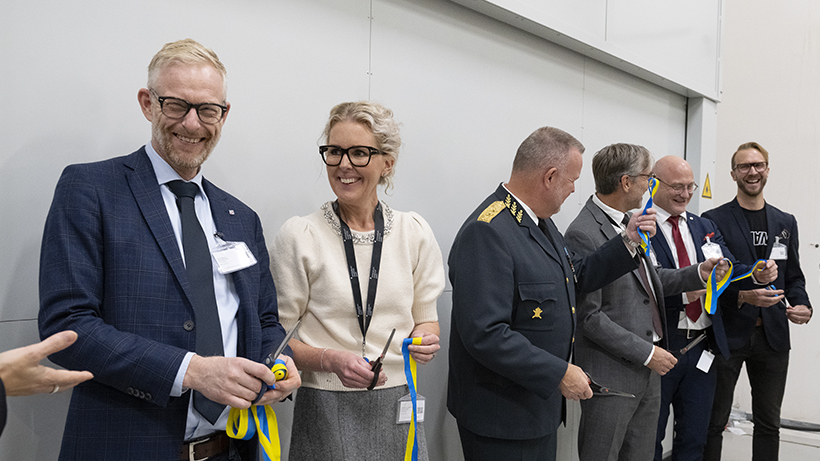Sweden Launches Collaboration in Trollhättan to Strengthen Defense Manufacturing

Sweden is taking a historic step toward building a new type of technical capability aimed at strengthening the total defense’s ability to quickly and securely manufacture spare parts. Today, the Advanced Manufacturing Coordination Center (AMCC) was inaugurated – a project that brings together civil and military expertise to develop advanced manufacturing for both civilian and defense-critical applications.
The project includes new machinery, advanced testing environments, and coordinated development to enhance Sweden’s technical freedom of action.
AMCC is a strategic initiative where the Swedish Armed Forces, industry, academia, and public actors jointly build new capabilities in additive manufacturing (3D printing) – a technology that enables fast and sustainable production of components and spare parts, even when supply chains are disrupted.
– Today is a big day for Trollhättan – and for Sweden. We are not just inaugurating a few machines, but a new Swedish capability – a chance to contribute to Sweden’s security and preparedness. That the Armed Forces now choose Trollhättan is a strong confirmation of the collaboration that already exists here – between business, academia, and the public sector, says Peter Eriksson, Chair of Trollhättan City Council and Chair of the Fyrbodal Municipal Association.
Collaboration Power for the Production of the Future
AMCC is jointly run by the Swedish Armed Forces, Innovatum Science Park, GKN Aerospace, University West, Waamlabz, and Trollhättan City. The consortium combines research, industrial experience, and technical expertise – demonstrating the collaborative strength needed to build the production of the future.
– To defend Sweden and our allies, we need both people and technology that can act quickly and independently. AMCC is a concrete step in building that capability – to manufacture, repair, and replace critical components even when regular supply chains are broken. It strengthens our preparedness, freedom of action, and defense, says Stefan Sandborg, Head of the Support Unit at the Swedish Armed Forces Headquarters.
Through AMCC, the foundation is laid for a national ecosystem for advanced manufacturing and repair, where Sweden strengthens its role in both European and transatlantic cooperation – taking another step toward a more robust and self-sufficient total defense.
– This is about more than just technology. We are building capacity and resilience that allows us to accelerate development and production, no matter the state of the world around us, says Linda Bohlin Trajkovski, CEO of Innovatum Science Park.
The initiative is driven by the increasing need to rapidly replace critical materials and components – even when supply chains are disrupted by crises or conflict.
A Strong Innovation Cluster
Through AMCC, new technical and organizational capabilities are being built to strengthen Sweden’s military capacity and civilian preparedness. Additive manufacturing makes it possible to produce and repair parts locally, reduce dependence on global suppliers, and create a more robust and flexible supply structure.
After 20 years of research and development in additive manufacturing and advanced production technologies, Trollhättan is a natural choice for the project. The city already hosts a strong innovation cluster where academia, industry, and society collaborate to develop the manufacturing methods of the future.
Through AMCC, Trollhättan’s role as a national hub for additive manufacturing is strengthened, and Sweden takes another step forward in developing advanced, sustainable, and defense-critical production.
The official inauguration marks the start of the project’s first phase, beginning in autumn 2025 – just months after the initial decisions were made and agreements signed. It demonstrates the speed, coordination, and determination that characterize this collaboration.
Shown in the picture: Peter Eriksson (Trollhättan City Council), Linda Bohlin Trajkovski (Innovatum Science Park), Stefan Sandborg (Swedish Armed Forces), Joakim Andersson (GKN Aerospace), Mats Jägstam (University West), and Eivind Vogel-Rödin (Waamlabz).